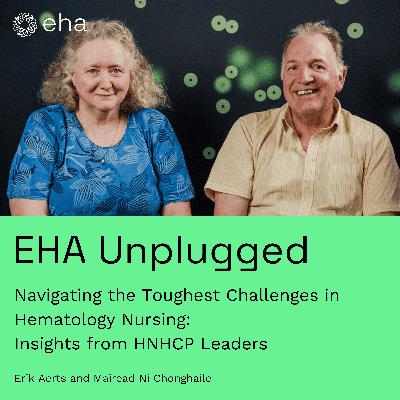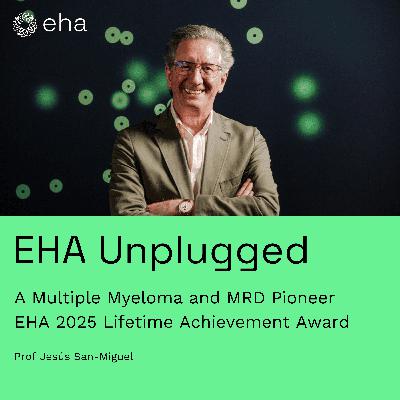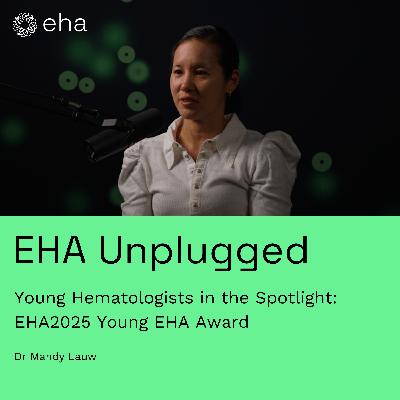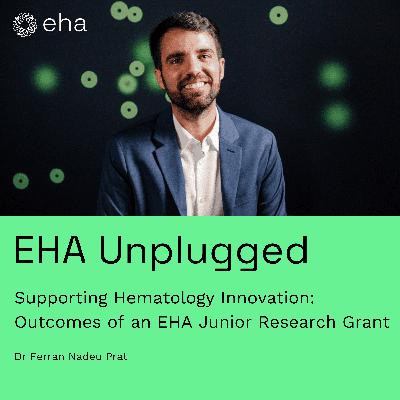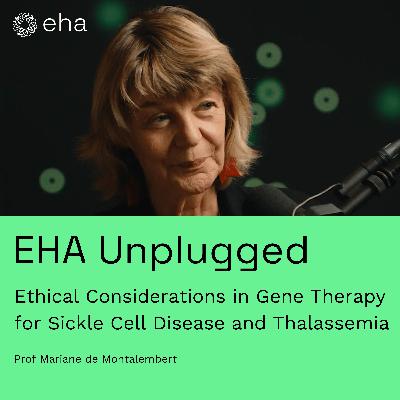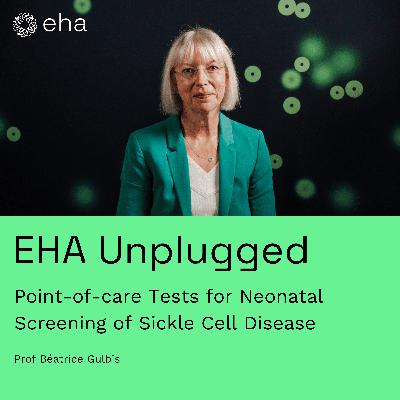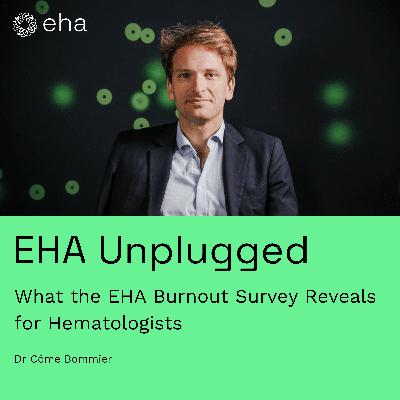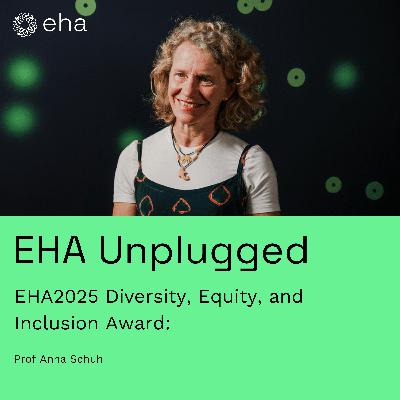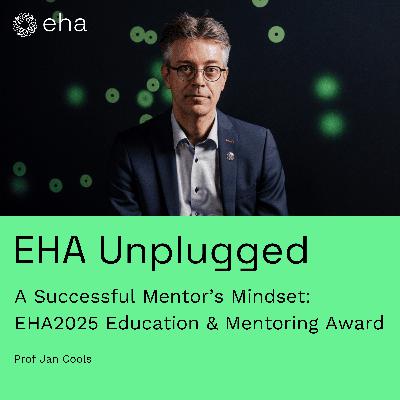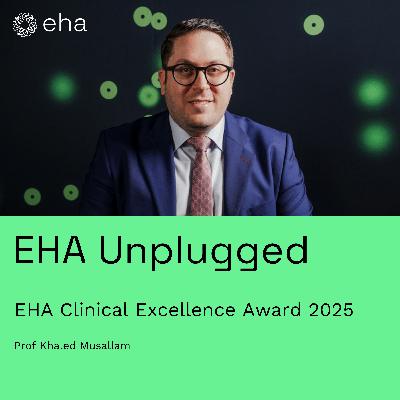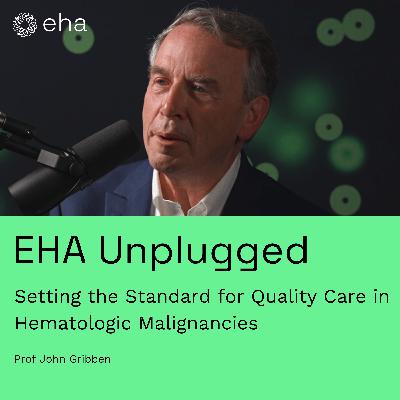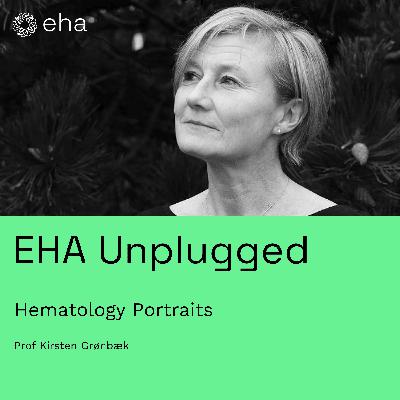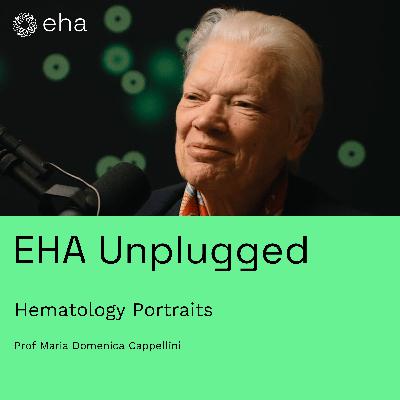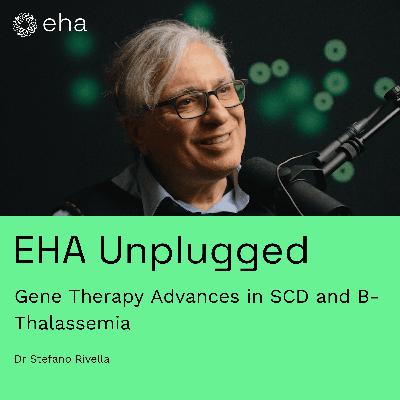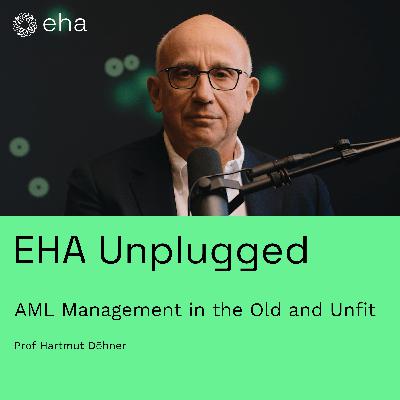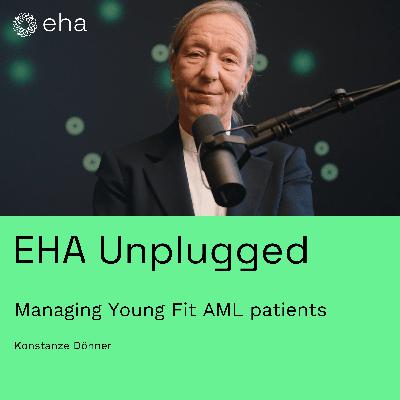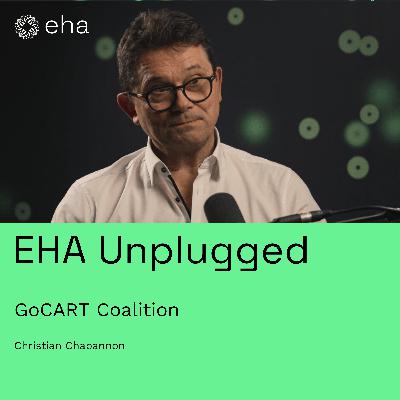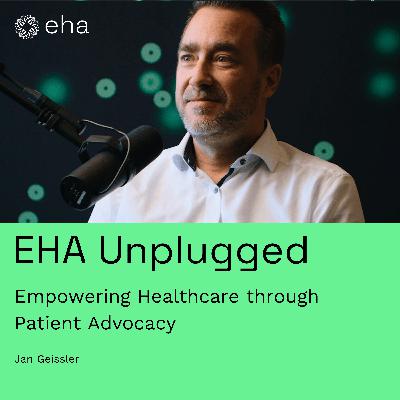Discover EHA Unplugged
EHA Unplugged

EHA Unplugged
Author: European Hematology Association
Subscribed: 30Played: 1,268Subscribe
Share
© European Hematology Association
Description
In these EHA-produced podcasts, experts share with you their hematology knowledge and stories. With "EHA Unplugged" we would like to give you the opportunity to unplug from your computer screen, while still learning, by listening to interviews, clinical cases, monologues, and more.
173 Episodes
Reverse
Join us for this interview with Dr Río-Machín from Autonomous University of Madrid in Spain as she discusses her research on rare subtypes of acute myeloid leukemia (AML), which she conducted thanks to the EHA Junior Research Grant. Her discovery of transcriptional activator of key leukemia drivers in one of these subtypes may pave way to new therapeutic approaches. Tune in to hear dr. Río-Machín‘s call for more collaborative research to achieve impactful results for patients in the future.Host: Isabel Olivera-Martinez, PhD, Medical Writer Guest: Dr Ana Río-MachínLearn MoreWhat did you think of this podcast? Share your opinions with us in this short feedback survey.https://forms.monday.com/forms/d02e52896815eef59ecae09fb74dd78f?r=use1Would you like to explore more eLearning or podcasts? Please visit the EHA Campus.https://ehaedu.org/CampusSubscribe, share, and review this podcast to be able to address topics you enjoy and like to listen to.Follow EHA on Instagram: https://www.instagram.com/EHA_Hematology/Facebook: https://e-h-a.link/facebookLinkedIn: https://www.linkedin.com/company/eha/Email us: education@ehaweb.orgSubscribe to receive the EHA Educational Updates via https://eha.news/subscribe
Join us for this discussion between Prof Argiris Symeonidis from University of Patras in Greece and Prof Sam Salek from University of Hertfordshire in UK who focus on the role of the hematologist in the diagnosis and management of patients with Gaucher disease. Prof Symeonidis and Prof Salek are both experts in recognizing and treating this rare lysosomal storage disorder and share their recommendations for hematologists to ensure earlier detection of this disease. Host: Prof. Sam Salek, University of Hertfordshire, UKGuest: Prof. Argiris Symeonidis, University of Patras, Rion, GreeceLearn MoreWhat did you think of this podcast? Share your opinions with us in this short feedback survey.https://forms.monday.com/forms/d02e52896815eef59ecae09fb74dd78f?r=use1Would you like to explore more eLearning or podcasts? Please visit the EHA Campus.https://ehaedu.org/CampusSubscribe, share, and review this podcast to be able to address topics you enjoy and like to listen to.Follow EHA on Instagram: https://www.instagram.com/EHA_Hematology/Facebook: https://e-h-a.link/facebookLinkedIn: https://www.linkedin.com/company/eha/Email us: education@ehaweb.orgSubscribe to receive the EHA Educational Updates via https://eha.news/subscribe
Join us for this inspiring interview with Erik Aerts from University Hospital Zurich in Switzerland and Mairéad Ní Chonghaile from St. James’s Hospital in Ireland who discuss their extensive work within the Hematology Nurses & Healthcare Professionals Group (HNHCP). Erik, the President, and Mairéad, the Vice-President of HNHCP, describe their unwavering commitment to providing hematology education to nurses and other healthcare professionals to ensure the best possible care for their patients. Tune in to hear what their thoughts are on the future of nursing in hematology and how they envisage addressing its biggest challenges. Host: Isabel Olivera-Martinez, PhD, Medical Writer Guests: Erik Aerts, Nurse Manager, University Hospital Zurich, Switzerland and President of Hematology Nurses & Healthcare Professionals Group (HNHCP) Mairéad Ní Chonghaile, Bone Marrow Transplant Coordinator, St. James’s Hospital, Dublin, Ireland and Vice-President of HNHCP Learn MoreWhat did you think of this podcast? Share your opinions with us in this short feedback survey.https://forms.monday.com/forms/d02e52896815eef59ecae09fb74dd78f?r=use1Would you like to explore more eLearning or podcasts? Please visit the EHA Campus.https://ehaedu.org/CampusSubscribe, share, and review this podcast to be able to address topics you enjoy and like to listen to.Follow EHA on Instagram: https://www.instagram.com/EHA_Hematology/Facebook: https://e-h-a.link/facebookLinkedIn: https://www.linkedin.com/company/eha/Email us: education@ehaweb.orgSubscribe to receive the EHA Educational Updates via https://eha.news/subscribe
Join us for this inspiring interview with prof. Jesús San-Miguel from Clínica Universidad de Navarra in Spain who discusses his extensive work to improve care for patients with multiple myeloma. Prof San-Miguel’s research and clinical contributions have shaped the current treatment landscape for multiple myeloma. For his contributions, he has received the 2025 EHA Lifetime Achievement Award. Tune in to hear his thoughts about the future of multiple myeloma management and the crucial role that collaborative research will play in it.Host: Isabel Olivera-Martinez, PhD, Medical Writer Guest: Prof Jesús San-Miguel, Clínica Universidad de Navarra, SpainLearn MoreWhat did you think of this podcast? Share your opinions with us in this short feedback survey.https://forms.monday.com/forms/d02e52896815eef59ecae09fb74dd78f?r=use1Would you like to explore more eLearning or podcasts? Please visit the EHA Campus.https://ehaedu.org/CampusSubscribe, share, and review this podcast to be able to address topics you enjoy and like to listen to.Follow EHA on Instagram: https://www.instagram.com/EHA_Hematology/Facebook: https://e-h-a.link/facebookLinkedIn: https://www.linkedin.com/company/eha/Email us: education@ehaweb.orgSubscribe to receive the EHA Educational Updates via https://eha.news/subscribe
Join us for this interview with Dr Mandy Lauw from Erasmus Medical Center in Rotterdam, Netherlands who describes her work to increase the visibility and voice of young hematologists within the EHA. For her unwavering efforts to improve the support and opportunities for young hematologists at the beginning of their career, Dr Lauw has been awarded the Young EHA Award. Tune in to hear about the many educational and mentoring programs EHA has available for young hematologists. Host: Isabel Olivera-Martinez, PhD, Medical Writer Guest: Dr Mandy LauwLearn MoreWhat did you think of this podcast? Share your opinions with us in this short feedback survey.https://forms.monday.com/forms/d02e52896815eef59ecae09fb74dd78f?r=use1Would you like to explore more eLearning or podcasts? Please visit the EHA Campus.https://ehaedu.org/CampusSubscribe, share, and review this podcast to be able to address topics you enjoy and like to listen to.Follow EHA on Instagram: https://www.instagram.com/EHA_Hematology/Facebook: https://e-h-a.link/facebookLinkedIn: https://www.linkedin.com/company/eha/Email us: education@ehaweb.orgSubscribe to receive the EHA Educational Updates via https://eha.news/subscribe
Join us for this interview with Dr Ferran Nadeu Prat from August Pi i Sunyer Biomedical Research Institute in Barcelona, Spain who discusses his work on evolution of chronic lymphocytic leukemia (CLL), which he conducted thanks to the EHA Junior Research Grant. Dr Nadeu Prat explains how the new insights into CLL evolution toward Richter transformation, which is a lethal complication of CLL, may lead to new therapeutic approaches. Tune in to hear his views on the future of this field and the role of collaborative research in achieving these goals.Host: Isabel Olivera-Martinez, PhD, Medical Writer Guest: Dr Ferran Nadeu Prat, August Pi i Sunyer Biomedical Research Institute, Barcelona, SpainLearn MoreWhat did you think of this podcast? Share your opinions with us in this short feedback survey.https://forms.monday.com/forms/d02e52896815eef59ecae09fb74dd78f?r=use1Would you like to explore more eLearning or podcasts? Please visit the EHA Campus.https://ehaedu.org/CampusSubscribe, share, and review this podcast to be able to address topics you enjoy and like to listen to.Follow EHA on Instagram: https://www.instagram.com/EHA_Hematology/Facebook: https://e-h-a.link/facebookLinkedIn: https://www.linkedin.com/company/eha/Email us: education@ehaweb.orgSubscribe to receive the EHA Educational Updates via https://eha.news/subscribe
Join us for this conversation with prof. Mariane de Montalembert from Necker-Enfants Malades Hospital in France who discusses the current standards of care for patients with sickle cell disease and thalassemia, both in Europe and in sub-Saharan Africa. Prof. de Montalembert highlights the inequalities and the unique challenges in implementation of complex innovative treatments, such as gene therapy. Tune in to hear her thoughts on the possible solutions for these challenges and future directions in this field. Host: Isabel Olivera-Martinez, PhD, Medical Writer Guest: Prof Mariane de Montalembert, Necker-Enfants Malades Hospital, Paris, FranceLearn MoreWhat did you think of this podcast? Share your opinions with us in this short feedback survey.https://forms.monday.com/forms/d02e52896815eef59ecae09fb74dd78f?r=use1Would you like to explore more eLearning or podcasts? Please visit the EHA Campus.https://ehaedu.org/CampusSubscribe, share, and review this podcast to be able to address topics you enjoy and like to listen to.Follow EHA on Instagram: https://www.instagram.com/EHA_Hematology/Facebook: https://e-h-a.link/facebookLinkedIn: https://www.linkedin.com/company/eha/Email us: education@ehaweb.orgSubscribe to receive the EHA Educational Updates via https://eha.news/subscribe
Join us for this inspiring interview with prof Béatrice Gulbis from The Brussels University Hospital in Belgium who discusses her extensive work on implementing neonatal screening for sickle cell disease (SCD) in low-resource countries in Africa. Prof Gulbis has been involved in collaborative projects to implement the testing methods that best fit the specific contexts. Tune in to hear her recommendations for the optimal SCD screening systems and her hopes for the worldwide collaborative approach to improve care for patients with SCD.Host: Isabel Olivera-Martinez, PhD, Medical Writer Guest: Prof Béatrice Gulbis, The Brussels University Hospital, BelgiumLearn MoreWhat did you think of this podcast? Share your opinions with us in this short feedback survey.https://forms.monday.com/forms/d02e52896815eef59ecae09fb74dd78f?r=use1Would you like to explore more eLearning or podcasts? Please visit the EHA Campus.https://ehaedu.org/CampusSubscribe, share, and review this podcast to be able to address topics you enjoy and like to listen to.Follow EHA on Instagram: https://www.instagram.com/EHA_Hematology/Facebook: https://e-h-a.link/facebookLinkedIn: https://www.linkedin.com/company/eha/Email us: education@ehaweb.orgSubscribe to receive the EHA Educational Updates via https://eha.news/subscribe
Join us for this interview with dr. Côme Bommier from Saint-Louis Hospital in Paris, France who describes the results of the recent EHA survey on burnout symptoms among hematology professionals in Europe. Dr. Bommier discusses the findings of the survey in the context of modifiable systemic factors. Tune in to hear him urge organizational reforms to ensure better work environments for hematologists, leading ultimately to better outcomes for patients. Host: Isabel Olivera-Martinez, PhD, Medical Writer Guest: Dr. Côme Bommier, Saint-Louis Hospital, Paris, FranceLearn MoreWhat did you think of this podcast? Share your opinions with us in this short feedback survey.https://forms.monday.com/forms/d02e52896815eef59ecae09fb74dd78f?r=use1Would you like to explore more eLearning or podcasts? Please visit the EHA Campus.https://ehaedu.org/CampusSubscribe, share, and review this podcast to be able to address topics you enjoy and like to listen to.Follow EHA on Instagram: https://www.instagram.com/EHA_Hematology/Facebook: https://e-h-a.link/facebookLinkedIn: https://www.linkedin.com/company/eha/Email us: education@ehaweb.orgSubscribe to receive the EHA Educational Updates via https://eha.news/subscribe
Join us for this inspiring conversation with prof. Anna Schuh from University of Oxford in the United Kingdom who describes her efforts to improve access to care for patients with hematological diseases in East African countries. Prof. Schuh describes the experience of sharing her time between the UK and East Africa and how this has impacted her clinical practice in both environments. Tune in to hear what her views are on how the Global North and Global South can learn from each other to improve care for patients everywhere. Host: Wilson Lim, PhD, Medical Writer Guest: Prof Anna Schuh, University of Oxford, United KingdomLearn MoreWhat did you think of this podcast? Share your opinions with us in this short feedback survey.https://forms.monday.com/forms/d02e52896815eef59ecae09fb74dd78f?r=use1Would you like to explore more eLearning or podcasts? Please visit the EHA Campus.https://ehaedu.org/CampusSubscribe, share, and review this podcast to be able to address topics you enjoy and like to listen to.Follow EHA on Instagram: https://www.instagram.com/EHA_Hematology/Facebook: https://e-h-a.link/facebookLinkedIn: https://www.linkedin.com/company/eha/Email us: education@ehaweb.orgSubscribe to receive the EHA Educational Updates via https://eha.news/subscribe
Join us for this inspirational interview with prof. Jan Cools from KU Leuven in Belgium who received the EHA 2025 Education & Mentoring Award. Prof. Cools describes his approach to mentoring students and scientists, emphasizing the aspects that he finds most crucial in this role. Tune in to hear his thoughts about the future of mentoring, the place artificial intelligence may take in it and the importance of failure on the road to success.Host: Isabel Olivera-Martinez, PhD, Medical Writer, EHA Guest: Prof. Jan Cools, KU Leuven Department of Human Genetics, BelgiumLearn MoreWhat did you think of this podcast? Share your opinions with us in this short feedback survey.https://forms.monday.com/forms/d02e52896815eef59ecae09fb74dd78f?r=use1Would you like to explore more eLearning or podcasts? Please visit the EHA Campus.https://ehaedu.org/CampusSubscribe, share, and review this podcast to be able to address topics you enjoy and like to listen to.Follow EHA on Instagram: https://www.instagram.com/EHA_Hematology/Facebook: https://e-h-a.link/facebookLinkedIn: https://www.linkedin.com/company/eha/Email us: education@ehaweb.orgSubscribe to receive the EHA Educational Updates via https://eha.news/subscribe
In this episode, we sit down with prof. Khaled Musallam from Burjeel Medical City in United Arab Emirates who discusses his extensive work to improve care for patients with thalassemia. Prof. Musallam’s research and clinical contributions have reshaped the management of both non-transfusion-dependent thalassemia (NTDT) and transfusion-dependent thalassemia (TDT). Tune in to hear his views on the current practice and future directions in the prevention and treatment of morbidities associated with thalassemia. For a comprehensive review of all aspects of thalassemia, the EHA Thalassemia Program is available to all EHA Members on Campus. Stay tuned for future episodes!Host: Isabel Olivera-Martinez, PhD, Medical Writer Guest: Prof Khaled MusallamLearn MoreWhat did you think of this podcast? Share your opinions with us in this short feedback survey.https://forms.monday.com/forms/d02e52896815eef59ecae09fb74dd78f?r=use1Would you like to explore more eLearning or podcasts? Please visit the EHA Campus.https://ehaedu.org/CampusSubscribe, share, and review this podcast to be able to address topics you enjoy and like to listen to.Follow EHA on Instagram: https://www.instagram.com/EHA_Hematology/Facebook: https://e-h-a.link/facebookLinkedIn: https://www.linkedin.com/company/eha/Email us: education@ehaweb.orgSubscribe to receive the EHA Educational Updates via https://eha.news/subscribe
Join us for this discussion between Robin Doeswijk, EHA European Affairs and prof. John Gribben from Barts Cancer Institute in the United Kingdom on the topic of equity in care of patients with hematologic malignancies. This discussion follows the recently published “European Cancer Organisation Essential Requirements for Quality Cancer Care: Hematological Malignancies”. Tune in to hear how this combination of organizational guidelines and clinical practice recommendations aims to improve diagnosis and care for all patients across Europe.Host: Robin Doeswijk, EHA European AffairsGuest: Prof John GribbenLearn MoreWhat did you think of this podcast? Share your opinions with us in this short feedback survey.https://forms.monday.com/forms/d02e52896815eef59ecae09fb74dd78f?r=use1Would you like to explore more eLearning or podcasts? Please visit the EHA Campus.https://ehaedu.org/CampusSubscribe, share, and review this podcast to be able to address topics you enjoy and like to listen to.Follow EHA on Instagram: https://www.instagram.com/EHA_Hematology/Facebook: https://e-h-a.link/facebookLinkedIn: https://www.linkedin.com/company/eha/Email us: education@ehaweb.orgSubscribe to receive the EHA Educational Updates via https://eha.news/subscribe
Join us for this captivating interview with Prof Kirsten Grønbæk from University of Copenhagen in Denmark, as she discusses her outstanding career in the field of hematology, both in research and in the clinics. Listen to how the interests of Prof Grønbæk evolved, leading her from the initial focus on epigenetics in lymphomas to MDS in the later years of her career. Prof Grønbæk reflects on the current developments in MDS and her tips for the leading a successful research team in hematology. Host: Isabel Olivera-Martinez, PhD, Medical Writer Guest: Prof Kirsten GrønbækLearn MoreWhat did you think of this podcast? Share your opinions with us in this short feedback survey.https://forms.monday.com/forms/d02e52896815eef59ecae09fb74dd78f?r=use1Would you like to explore more eLearning or podcasts? Please visit the EHA Campus.https://ehaedu.org/CampusSubscribe, share, and review this podcast to be able to address topics you enjoy and like to listen to.Follow EHA on Instagram: https://www.instagram.com/EHA_Hematology/Facebook: https://e-h-a.link/facebookLinkedIn: https://www.linkedin.com/company/eha/Email us: education@ehaweb.orgSubscribe to receive the EHA Educational Updates via https://eha.news/subscribe
In this episode, we sit down with Prof. Maria Domenica Cappellini from the University of Milan in Italy, as she discusses her inspiring career as a hematologist specializing in the management of patients with thalassemia. Listen to the compelling story of how Prof. Cappellini’s interest in thalassemia started and how her relentless stride for the best possible care for her patients has helped to transform the way this disease is managed. Tune in to hear prof. Cappellini’s words of advice for the younger generation of hematologists interested in the field of thalassemia. Host: Isabel Olivera-Martinez, PhD, Medical Writer Guest: Prof Maria Domenica CappelliniLearn MoreWhat did you think of this podcast? Share your opinions with us in this short feedback survey.https://forms.monday.com/forms/d02e52896815eef59ecae09fb74dd78f?r=use1Would you like to explore more eLearning or podcasts? Please visit the EHA Campus.https://ehaedu.org/CampusSubscribe, share, and review this podcast to be able to address topics you enjoy and like to listen to.Follow EHA on Instagram: https://www.instagram.com/EHA_Hematology/Facebook: https://e-h-a.link/facebookLinkedIn: https://www.linkedin.com/company/eha/Email us: education@ehaweb.orgSubscribe to receive the EHA Educational Updates via https://eha.news/subscribe
Explore the latest breakthroughs in gene therapy for sickle cell disease and beta thalassemia with Dr. Stefano Rivella, hematologist and research faculty at Children's Hospital of Philadelphia. In this episode, Dr. Rivella discusses the science behind FDA-approved therapies, compares gene addition and gene editing approaches, and shares insights on clinical safety, efficacy, and future innovations like in vivo gene therapy. Learn about the challenges of access, cost, and global equity, and discover how evolving technologies could transform treatment for patients worldwide. Host: Isabel Olivera-Martinez, PhD, Medical Writer Guest: Dr Stefano RivellaLearn MoreWhat did you think of this podcast? Share your opinions with us in this short feedback survey.https://forms.monday.com/forms/d02e52896815eef59ecae09fb74dd78f?r=use1Would you like to explore more eLearning or podcasts? Please visit the EHA Campus.https://ehaedu.org/CampusSubscribe, share, and review this podcast to be able to address topics you enjoy and like to listen to.Follow EHA on Instagram: https://www.instagram.com/EHA_Hematology/Facebook: https://e-h-a.link/facebookLinkedIn: https://www.linkedin.com/company/eha/Email us: education@ehaweb.orgSubscribe to receive the EHA Educational Updates via https://eha.news/subscribe
Join us for this insightful interview with prof. Hartmut Döhner from University Hospital Ulm in Germany who tells about most recent developments in the management of older and unfit patients with AML. Prof. Döhner discusses all key aspects of the management including assessing patient fitness, genetic risk classification, and the choice of treatment, among which also the emerging therapies. Tune in, to hear about the most relevant recommendations for the clinical decision making while treating older unfit patients with AML.Host: Isabel Olivera-Martinez, PhD, Medical Writer Guest: Prof Hartmut Döhner, University Hospital Ulm, GermanyLearn MoreWhat did you think of this podcast? Share your opinions with us in this short feedback survey.https://forms.monday.com/forms/d02e52896815eef59ecae09fb74dd78f?r=use1Would you like to explore more eLearning or podcasts? Please visit the EHA Campus.https://ehaedu.org/CampusSubscribe, share, and review this podcast to be able to address topics you enjoy and like to listen to.Follow EHA on Instagram: https://www.instagram.com/EHA_Hematology/Facebook: https://e-h-a.link/facebookLinkedIn: https://www.linkedin.com/company/eha/Email us: education@ehaweb.orgSubscribe to receive the EHA Educational Updates via https://eha.news/subscribe
Join EHA President prof. Konstanze Döhner from University Hospital Ulm in Germany who discusses the most recent developments in the management of young and fit patients with AML. Tune in to hear about the diagnostic workup, risk stratification, treatment and the evolving role of measurable residual disease (MRD) measurements in clinical decision making in this group of patients. Prof. Döhner also shares her thoughts on the future of the treatment landscape for AML. Host: Isabel Olivera-Martinez, PhD, Medical Writer Guest: Prof Konstanze DöhnerLearn MoreWhat did you think of this podcast? Share your opinions with us in this short feedback survey.https://forms.monday.com/forms/d02e52896815eef59ecae09fb74dd78f?r=use1Would you like to explore more eLearning or podcasts? Please visit the EHA Campus.https://ehaedu.org/CampusSubscribe, share, and review this podcast to be able to address topics you enjoy and like to listen to.Follow EHA on Instagram: https://www.instagram.com/EHA_Hematology/Facebook: https://e-h-a.link/facebookLinkedIn: https://www.linkedin.com/company/eha/Email us: education@ehaweb.orgSubscribe to receive the EHA Educational Updates via https://eha.news/subscribe
Listen as Prof. Christian Chabannon from Aix Marseille Université in France who tells about GoCART Coalition in this new podcast episode. The main goal of this coalition, which unites expertise from many fields, is to promote access to novel cellular therapies, such as CAR T-cells. Prof. Chabannon explain how GoCART is working on reaching this goal by generating new clinical insights, improving standards of care, providing education and building policy. Tune in to learn more about the impact of this coalition on healthcare today and in the future. Stay tuned for future episodes! Host: Isabel Olivera-Martinez, PhD, Medical Writer Guest: Prof. Christian ChabannonLearn MoreWhat did you think of this podcast? Share your opinions with us in this short feedback survey.https://forms.monday.com/forms/d02e52896815eef59ecae09fb74dd78f?r=use1Would you like to explore more eLearning or podcasts? Please visit the EHA Campus.https://ehaedu.org/CampusSubscribe, share, and review this podcast to be able to address topics you enjoy and like to listen to.Follow EHA on Instagram: https://www.instagram.com/EHA_Hematology/Facebook: https://e-h-a.link/facebookLinkedIn: https://www.linkedin.com/company/eha/Email us: education@ehaweb.orgSubscribe to receive the EHA Educational Updates via https://eha.news/subscribe
Jan Geissler from Germany tells about his work as a patient advocate in the field of hematological malignancies. As a cancer survivor, patient advocate and patient engagement expert, Jan has been working tirelessly for many years in organizations such as European Patients Academy (EUPATI), Patvocates and many others. Listen to Jan’s passionate call for a collaborative spirit to achieve the best outcomes for patients. Tune in to hear his views on patient advocacy and the impact it has on patient care. Stay tuned for future episodes! Guest: Jan Geissler, Patient Advocate, Germany Host: Isabel Olivera-Martinez, PhD, Medical Writer Learn MoreWhat did you think of this podcast? Share your opinions with us in this short feedback survey.https://forms.monday.com/forms/d02e52896815eef59ecae09fb74dd78f?r=use1Would you like to explore more eLearning or podcasts? Please visit the EHA Campus.https://ehaedu.org/CampusSubscribe, share, and review this podcast to be able to address topics you enjoy and like to listen to.Follow EHA on Instagram: https://www.instagram.com/EHA_Hematology/Facebook: https://e-h-a.link/facebookLinkedIn: https://www.linkedin.com/company/eha/Email us: education@ehaweb.orgSubscribe to receive the EHA Educational Updates via https://eha.news/subscribe




